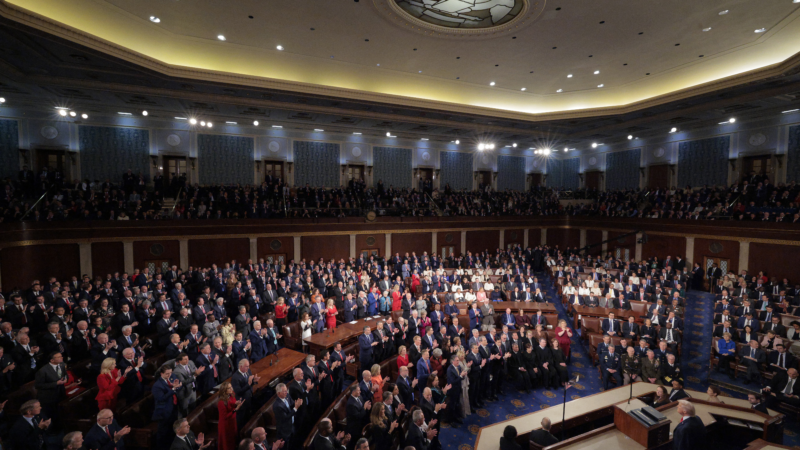Trump’s tariffs could cut deficit by $2.8 trillion over next decade — with caveats
Congressional forecasters say President Trump’s tariffs could raise trillions of dollars over the next decade — if they remain in place — more than offsetting the additional red ink that’s projected to flow from a sweeping budget bill passed by the House last month.
Since taking office in January, Trump has imposed taxes of 10 to 50% on nearly everything the U.S. imports. Those taxes have already raised tens of billions of dollars in revenue.
If the tariffs become permanent, they’re expected to reduce the federal deficit by $2.8 trillion by 2035, according to a letter released Wednesday by the non-partisan Congressional Budget Office.
A separate CBO forecast out earlier in the day shows the combination of tax cuts and spending cuts in the House-passed budget bill would increase the deficit by $2.4 trillion over the same period.
There are big unknowns, however
The tariff forecast includes a number of caveats.
“Because the United States has implemented no increases in tariffs of this size in many decades, there is little relevant empirical evidence on their effects,” writes CBO director Phillip Swagel. The high taxes might discourage imports more than expected, which would result in lower revenues. On the other hand, if imports drop less than expected due to tariffs, the government could end up raising more money.
The forecast assumes that most of the tariffs in place in mid-May are made permanent. It does not include the doubling of tariffs on steel and aluminum imports that took effect Wednesday, or the prospect that higher tariffs, which have been temporarily suspended, might return.
Many of the tariffs were imposed under a novel reading of a 1977 law, and they are being challenged in court, though they remain in effect for now.
In addition to cutting deficits, forecasters project the tariffs will result in higher inflation this year and next and slower economic growth.
Forecasters say tariffs will likely raise prices for both rich families and poor families, although the CBO is still sorting out which end of the income ladder would be hit hardest.
When a horse whinnies, there’s more than meets the ear
A new study finds that horse whinnies are made of both a high and a low frequency, generated by different parts of the vocal tract. The two-tone sound may help horses convey more complex information.
Hundreds of American nurses choose Canada over the U.S. under Trump
More than 1,000 American nurses have successfully applied for licensure in British Columbia since April, a massive increase over prior years.
Trump’s many tariff tools mean consumer prices won’t go down, analysts say
The Supreme Court struck down President Trump's signature tariffs. But the president has other tariff tools, and consumers shouldn't expect cheaper prices anytime soon, economists say.
Tax credits for solar panels are available, but the catch is you can’t own them
Rooftop solar installers are steering customers toward leases instead of purchases. Federal tax credits for purchased systems have ended but are still available for leased ones.
5 takeaways from Trump’s State of the Union address
President Trump hit familiar notes on immigration and culture in his speech Tuesday night, but he largely underplayed the economic problems that voters say they are most concerned about.
China restricts exports to 40 Japanese entities with ties to military
China on Tuesday restricted exports to 40 Japanese entities it says are contributing to Japan's "remilitarization," in the latest escalation of tensions with Tokyo.






